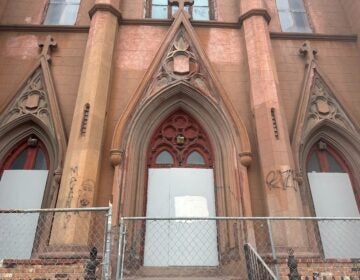SugarHouse requests transfer of slots license

Photo courtesy of Brad Maule, check out his complete portfolio at www.phillyskyline.com/lovecopter
Aug. 19
By Kellie Patrick Gates
For PlanPhilly
HSP Gaming – the developer of SugarHouse Casino – has asked the Pennsylvania Gaming Control Board to transfer its slots license to another entity under the HSP organizational umbrella.
If the PGCB grants the transfer, HSP says in documents filed earlier this month, that decision would enable the casino to secure funding and begin building. And it would also save HSP Gaming from potentially having to pay a “substantial” real estate transfer tax to the City of Philadelphia.
HSP says its prospective lenders want the borrower to be a holding company, not the slots licensee. And they want another, single entity to hold both the gaming license and the land, real property, and other assets.
Currently, HSP holds the license, but the Delaware Avenue land where the casino is slated to be built is owned by SugarHouse – the indirect, wholly owned subsidiary that will operate the casino. So HSP is asking the Gaming Control Board to transfer the slots license to SugarHouse. HSP would then meet the lenders’ requirements for a holding company.
Andrew Ross, the city’s chief deputy solicitor, said he had not thoroughly reviewed the documents yet, but based on what he knows, the city will not be filing any motions with the PGCB related to SugarHouse’s request.
“Who actually is the technical, legal entity (that holds the license) doesn’t matter as far as we would be concerned,” he said. The things that matter to the city wouldn’t change, he said – for example, the site would be the same, and the building would be the building that has received city approvals.
The existing company structure worked just fine until the recession hit, HSP says. “At the time the real property was acquired by SugarHouse, one of the favored types of financing for casinos was Commercial Mortgage-Backed Security (CMBS) financing,” the documents say. The existing organization structure was created to accommodate CMBS or another type of securitization and financing option. But those options, the documents say, have dried up. “A CMBS financing is no longer viable.”
There is another option that would also result in a single entity holding the slots license and property that would not require a Gaming Control Board petition.
The property now owned by SugarHouse could be transferred to license-holder HSP Gaming and a new holding company could be inserted above HSP.
But “HSP has been advised that transferring the land upstream to HSP from SugarHouse may trigger a substantial realty transfer tax,” the documents say.
And adding another organizational layer would “significantly complicate the ownership structure and the documentation necessary for the financing, which could potentially delay closing of the financing and therefore the opening of the interim facility.”
Mary Isaacson, spokeswoman for Rep. Mike O’Brien, who opposes the casino’s waterfront location, said the PGCB should have to address the license switch in a public hearing.
Isaacson also questions whether the PBCB should grant a license change so that SugarHouse would not have to pay additional taxes.
“In these economic times, an executive board is going to help a casino avoid paying taxes?” she asked. The city is “about to cut off fire fighters, police and the rest of them” because of budget constraints, she said.
No one at the PGCB could be reached for comment Wednesday.
But Ross says the license change would not mean HSP would pay the city less than it is slated to right now. HSP is just trying to avoid changing things in a way that would result in the organization owing the city additional taxes. “It’s not like they are trying to get out of something they had to pay us,” he said.
HSP notes that the license switch would not change the ownership of the casino – no new people or entities would be added.
HSP also filed a document asking that the PBCB keep the supporting exhibits PGCB filed with the motion confidential. “The Exhibits contain business and other proprietary information relating to HSP, including financial covenants, interest rates, and other financial data,” the document states.
On Monday, Standard & Poor’s Leveraged Commentary & Data unit reported that SugarHouse is expected to get a $150 million loan from Credit Suisse and Jefferies Finance by the end of this week.
SugarHouse spokeswoman Leigh Whitaker had no comment on the casino’s financing or the filing with the PGCB. But she said SugarHouse is working to break ground by the end of summer.
Contact the reporter at kelliespatrick@gmail.com
WHYY is your source for fact-based, in-depth journalism and information. As a nonprofit organization, we rely on financial support from readers like you. Please give today.






